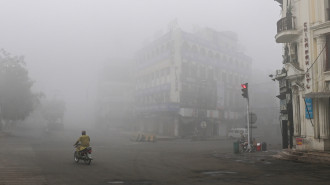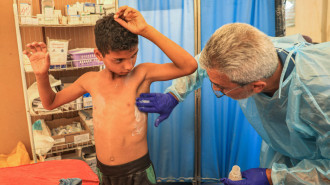
Like Gaza, Lebanon's children and students now in a state of education limbo amid Israel's bombs and invasion

The joy Zahraa Ahmed, a ten-year-old from Srifa village in southern Lebanon, once found in school has been replaced by fear and uncertainty.
Displaced by Lebanon’s recent war, she now lives in a crowded shelter in Beirut, her dreams of learning and playing with friends shattered by a conflict that has upended her life.
The young student and her family are among those internally displaced Lebanese forced to flee their homes in the southern provinces, as Israel's continuing airstrikes rage on.
The country's Prime Minister Najib Mikati said Israel's war may have already forced as many as one million people from their homes across Lebanon, calling it the "largest displacement movement that may have happened."
Late Monday night, Israel began its invasion of southern Lebanon following a night of heavy bombing across the country killing dozens of people.
Israeli special forces had already crossed the border, according to reports, usually the first steps to a larger invasion force moving in.
Amid this, Beirut's Kola and Dahieh districts were subject to airstrikes, rocking the capital, while other areas in southern Lebanon were heavily bombed.
The war has claimed over 1,500 lives as relentless airstrikes ravaged hundreds of villages over the past week.
Those displaced now seek refuge in 533 centres across the country.
Schools across the Levant nation have suspended classes as many have been converted into shelters.
“I miss school so much,” she told The New Arab.
“Right now, I spend my day in the shelter, without doing anything.”
Despite her age, Zahraa’s parents said she “carries a burden far beyond her years.”
The war has left her and hundreds of thousands of other school-age children “in a state of limbo,” unable to see beyond the daily struggle for safety.
“I’m not happy here. Nothing is like my home, my school, or my friends,” she said.
The war in Gaza has spilt over into southern Lebanon after Iran-backed Hezbollah opened a front on the border in support of its ally Hamas.
Since then, Hezbollah and its allies have been exchanging fire with Israeli forces.
Before October 2023, more than 700,000 children in Lebanon were already out of school.
With the partial or complete closure of 72 schools by May in the south, an additional 20,000 children have been affected.
Zahraa’s concerns go beyond her interrupted education; she lives in constant fear.
“Last year, we didn’t learn much. We were thinking about the bombings all the time,” she said.
“I love school, but I don’t know if I will ever be able to attend again.”
Though overwhelmed by fear, Zahraa clings to a fragile hope that the war will end, allowing her and her peers to return to school and resume the “childhood that was stolen from them.”
A future put on hold
Safi Hussein, a marketing student at a university in Beirut, had been eagerly awaiting the end of his senior year, ready to step into the professional world. The war, however, has upended those plans.
Following Israel’s attack on a southern Beirut suburb which claimed the life of senior Hezbollah commander Fouad Shukr, Safi fled with his family from Beirut’s southern neighborhoods to a safer area to the north.
“Even after we moved, I didn’t feel truly safe,” he told The New Arab.
“I’m living with constant anxiety. This was supposed to be my graduation year, but now I can’t even go to university.”
Safi’s struggles are not limited to his disrupted education; the psychological toll weighs heavily on every aspect of his life.
“My mental state is at rock bottom. Every time I step outside, I’m hyper-aware. If I hear a loud noise or sudden commotion, I immediately fear for my family and relatives. I live in constant worry — there’s no peace, no comfort,” he said.
The thought of remote learning, which has been a viable alternative in south Lebanon for thousands of students since May, now feels irrelevant in the shadow of war.
“Remote learning didn’t work during the pandemic, and it’s not going to work now,” Safi explains.
“Back then, it wasn’t effective, and today, with the war, we can’t even think about studying. All anyone talks about is the airstrikes and if the situation will escalate.”
He adds that even if classes were to resume, the “pervasive anxiety” would affect both teachers and students alike.
“Even if we learn, the quality isn’t there. The teachers are distracted, we’re distracted — no one can focus when bombs are falling.”
Safi, once eager to celebrate his graduation with friends and excited to enter the job market, is now burdened by fear and uncertainty.
“If things keep going like this, of course, I’ll leave. I’ll go abroad, where it’s safer, where there’s more security, and where I’ll have a better chance to achieve my goals,” he said.
Could remote learning become a viable option?
Ahmad Saleh, the head of the educational district in southern Lebanon, told The New Arab about the Lebanese government’s preparations to face the ongoing educational crisis in an interview.
“We were still in the preparatory phase, and classes hadn’t started yet,” he stated. “We were planning to begin the school year soon, but the minister announced a delay until October 14.”
Following Israel’s recent attacks, the schools were turned into “make-shift shelters” for the thousands of displaced, and all plans became contingent on what happens next, he added.
“We’re ready to start the academic year if the war ends, but if it continues, we plan on implementing online learning nationwide,” Ahmad said.
However, he acknowledges that online learning is no easy solution, especially under the current circumstances.
“Remote learning requires a solid plan, reliable internet, and suitable conditions,” he said.
“The problem is, many students are living in shelters, where it’s almost impossible to create a proper learning environment. How can you study in a room crowded with 15 people?”
Another obstacle making remote learning far from feasible is the frequent power outages and disruptions to communication networks.
Caretaker Minister of Communications Johnny Corm mandated cellular companies Alfa and Touch to offer free 20-GB internet packages for students shifting to remote learning in June, but limited internet access in southern villages remains a major issue according to Ahmad.
Despite these obstacles, the director pointed to last year’s successes in completing the academic year and administering official exams, even amid the conflict.
“But the challenge is not solely academic,” he added, noting that the mental strain that students endure is another “major obstacle to learning.”
“It's hard to concentrate on studies when living in such perilous circumstances,” he told The New Arab.
“I can only say that students in southern Lebanon have developed a unique resilience. They’ve lived through these conditions and unfortunately now adapted to it.”
Yet, even with this resilience, displacement and the broader effects of war create a significant burden on students.
“They may seem calm, but they always remember what happened. Their families might not be comfortable in these circumstances either. Displacement affects everyone, and of course, it impacts their education,” he added.
The Ministry of Education is currently training teachers to provide mental health support to students.
“We’re training a group of teachers to offer psychological support, and this will be rolled out to students soon,” he said.
“We know the challenges aren’t easy, but we’ll do whatever we can so that the educational process continues, no matter the circumstances.”
Bilal Ghazeye is a Lebanese journalist, currently working as a news editor and reporter at Lebanos News, and a communication officer at LOGI, a non-governmental organization that promotes transparency and accountability in the Lebanese oil and gas sector.
This article is published in collaboration with Egab
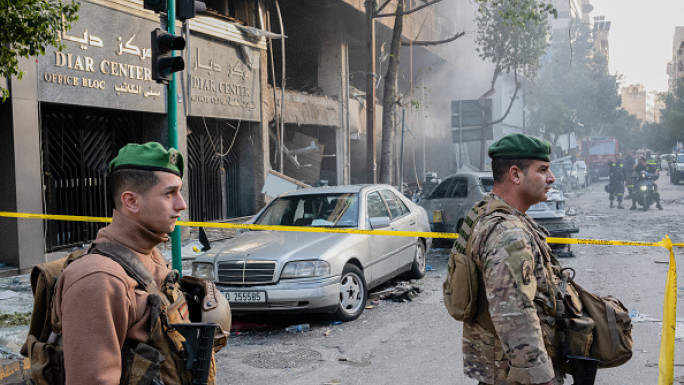
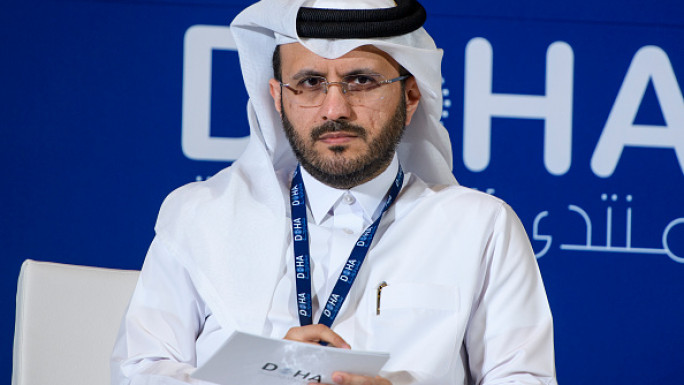
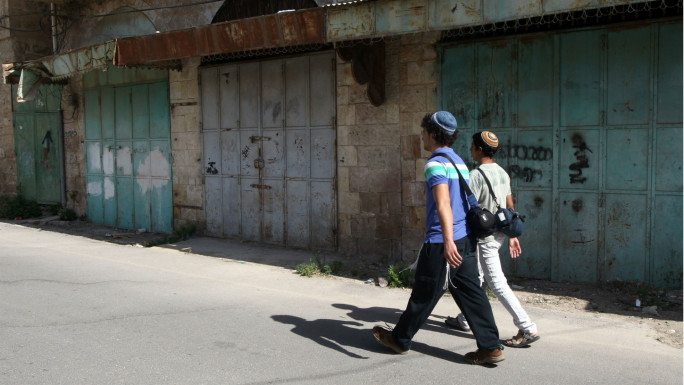
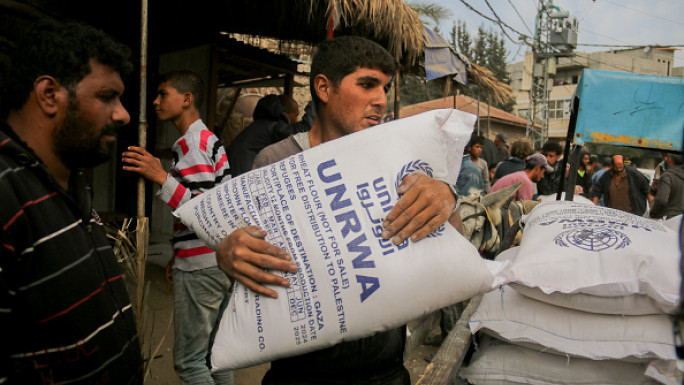
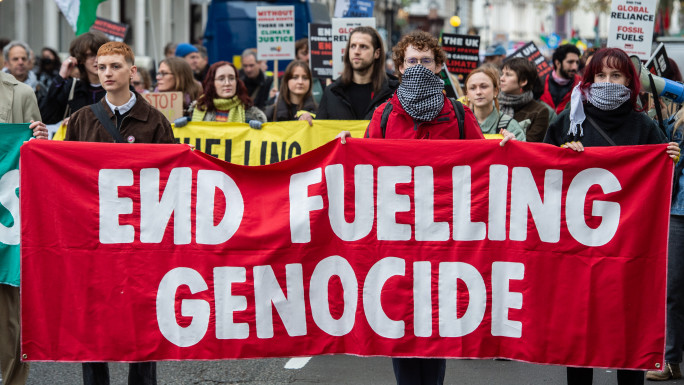
 Follow the Middle East's top stories in English at The New Arab on Google News
Follow the Middle East's top stories in English at The New Arab on Google News
